EVAN: Evolutional Video Streaming Adaptation via Neural Representation

Abstract
Adaptive bitrate (ABR) using conventional codecs cannot further modify the bitrate once a decision has been made, exhibiting limited adaptation capability. This may result in either overly conservative or overly aggressive bitrate selection, which could cause either inefficient utilization of the network bandwidth or frequent re-buffering, respectively. Neural representation for video (NeRV), which embeds the video content into neural network weights, allows video reconstruction with incomplete models. Specifically, the recovery of one frame can be achieved without relying on the decoding of adjacent frames. NeRV has the potential to provide high video reconstruction quality and, more importantly, pave the way for developing more flexible ABR strategies for video transmission. In this work, a new framework, named Evolutional Video streaming Adaptation via Neural representation (EVAN), which can adaptively transmit NeRV models based on soft actor-critic (SAC) reinforcement learning, is proposed. EVAN is trained with a more exploitative strategy and utilizes progressive playback to avoid re-buffering. Experiments showed that EVAN can outperform existing ABRs with 50% reduction in re-buffering and achieve nearly 20% improvement in users’ quality of experience (QoE).